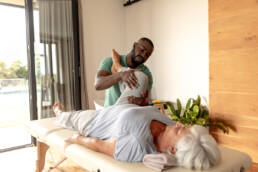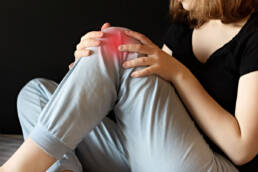The knees are prone to damage and injuries since they are among the most utilized parts of the body. Walking, running, standing and even sitting – every activity involves the knee. Thus, people with knee pain will not only deal with the physical pain but will also have to deal with the emotional distress brought about by the pain and difficulty moving around.
Causes of Knee Pain
Knee pain can come from sudden injuries such as dislocation, sprain or fractures after a fall. Everyday activities, especially those that involve sports, can cause the knee tissues to wear and tear, resulting in pain. Joint inflammation due to arthritis is also a common cause.
Treating Knee Pain
Home remedies are sometimes effective in treating mild to moderate knee pain. Putting an ice pack over the affected area, over-the-counter analgesics and herbal supplements are among the many home remedies that can provide relief. However, these techniques may not work for those who suffer from moderate to intense pain.
Depending on the cause and intensity of knee pain, physicians may advise patients to undergo knee injections, physical therapy or even surgery.
Knee injections are specifically for people suffering from knee pain due to joint problems or osteoarthritis. There are three types of knee injection: arthrocentesis, corticosteroid injection and hyaluronic acid injection.
Arthrocentesis, also known as joint aspiration, is the process of removing excess synovial fluid that can trigger pain and inflammation through injection. This relieves pain and swelling, and the collected fluid may be used for a lab test for those with undiagnosed joint problems. After removing the excess fluid, another shot will be made on the same spot to insert corticosteroid to provide quick relief.
Hyaluronic injection is the replacement of hyaluronic acid normally found in the synovial fluid. The low hyaluronic acid may contribute to stiffness and pain in people with osteoarthritis. Among the three, the hyaluronic acid injection may take time to take effect but provides the longest relief.
Whether it’s a mild or severe knee pain, it’s important to consult with a physician. At Denver Physical Medicine & Rehab, our medical doctors, Denver physical therapists, massage therapists and other medical practitioners will work together to correctly diagnose the cause of your knee pain and prescribe a course of treatment that will get you back to living a life free from knee pain. To schedule a consultation, please call 303-757-7280.
Ready for an expert opinion? Get in touch today!
Discover how physical therapy can help manage scoliosis in mild to moderate cases, along with other ways it offers healthcare solutions. Learn more from Dr. Mansi Dua, DPT, C2 Schroth Certified.





